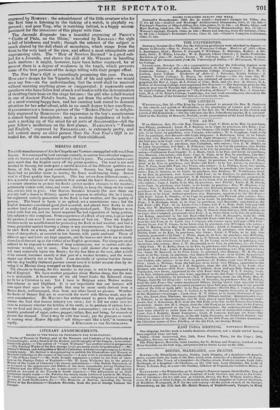MERINO SHEEP.
THE cloth manufacturers of Aix-1 a-Cha pelle and Verviers aresupplied with wcol from Saxony. It is conveyed by land carriage entirely, in narrow four-wheeled waggons, wiilt six horses,of an excellent cart breed yoked in pairs. The inanufacturerS com- plain much that the English carry oft' the prime qualities. The wool is not well assorted in Saxony, but undergoes a careful division of the different qualities on a fleece, at Aix, by the great wool-merchants. Saxony has long proved that Spain had no peculiar claim to rearing the finest wool-bearing sheep. Saxon wool is of finer quality than Spanish. This has arisen front different causes,- first, a careful selection of the animals that carried the finest fleeces ; secondly, a constant attention to protect the flocks against sudden changes in the weather, particularly violent cold, rains, and snow ; thirdly, to keep the sheep on dry sound soil, not too rich in grass. Our Merino breeders formerly (for now there are scarcely half a dozen in Britain) spared no expense in selecting the bet breed, but neglected entirely protection to the flock in bad weather, and the quality of pasture: The breed in Spain is an upland, not a mountainous race but the English breeders considered good feed essential, and placed their flocks in rich meadow land or old pasture grass of an under-stocked park. The Merinos were seized with foot rot, and the breed acquired the bad reputation of being particu- lady subject to this complaint. From experience of a flock of my own, kept on bard dry pasture, I can aver I never saw an instance of foot rot. Then the English breeders made no establishment for protecting the flock in bad weather, and had a strong prejudice against housing a sheep in any circumstances. .1 he Saxons have for each flock on a farm, and often in every large enclosure, a regularly-built range of sheep-sheds, or covered-in low houses, with yards enclosed. Those of different ages and kinds are kept separate, and the houses and sheds are as nicely cleaned and dressed up as the stables of an English sportsman. The sheep are never suffered to be exposed to showers of long continuance, nor to sudden cold after moderate weather, nor to snow. One heavy cold shower after warm weather will most materially injure the fleece ; for the fine fibre at the root, after a chill of the animal, becomes exactly at that part of a weaker texture; and the wool_ stapler can directly det •ct the fault. I am decidedly of opinion that the farmer who ha; dry healthy sheltered pasture cannot turn it to better account than by de- voting it to Merino sheep managed on the Saxon plan. The climate in Saxony, for five months in the year, is not to be compared to that of England. We have another prejudice about Merino sheep, that the mut- ton is detestable. A Scotchman of the old breed thinks the Bakeweil sheep not fit for a Christian to eat. Yet I have in Belgium eaten Merino mutton little inferior to real Highland. It is not improbable that our farmers will soon open their eyes to the profit that may be more surely derived from a Merino flock, well-managed, than from any other breed we possess. .Whether the flocks of Botany Bay are to overstock the world with Merino wool, may de- serve consideration. Mr. MALTHUS has endeavoured to prove that population outruns the food that human industry can raise ; but it did not enter into his views to estimate whether the fertility of the earth, in its produce of certain luxu- ries for food and dress, might not outrun the consumption ; yet so it is, that the quantity produced of sugar, cotton, pepper, indigo, flax, and hemp, far exceeds at present the demand. Thus it may be with fine wool; yet the pleasure or vanity of wearing what Mater Sly calls " soft things-and like a lord," is.increasing


















 Previous page
Previous page